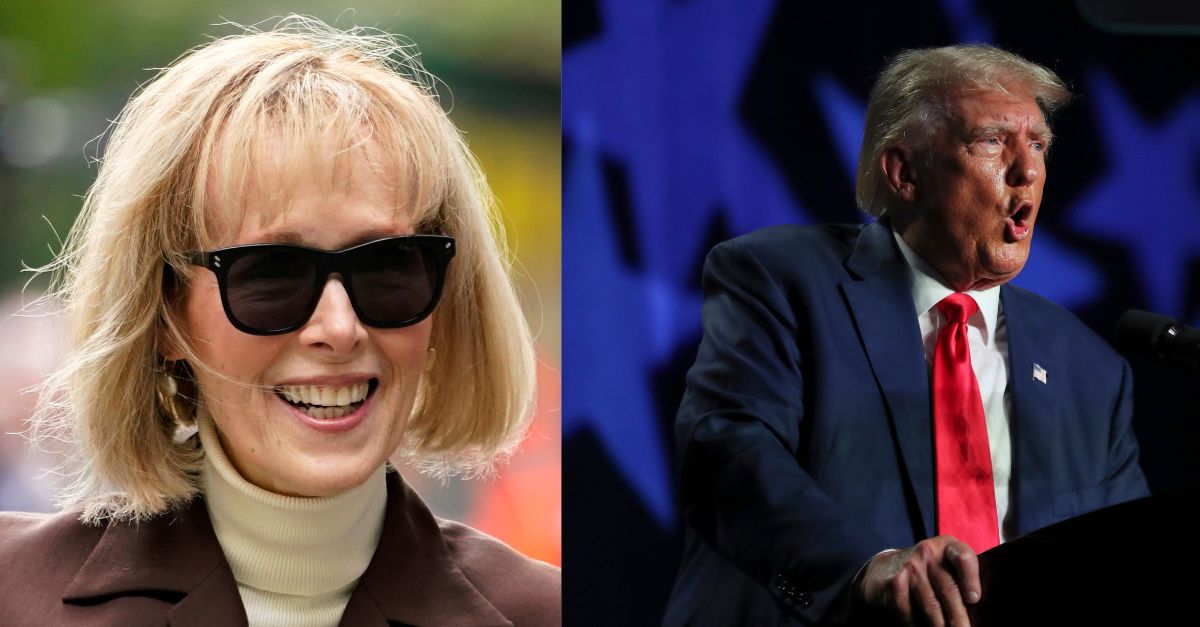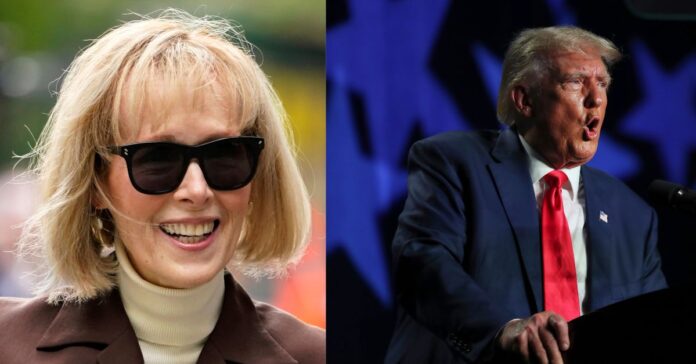
Left: E. Jean Carroll arrives at Manhattan federal court in May 2023 (AP, John Minchillo), Right: Former President Donald Trump speaks during the 56th annual Silver Elephant Gala in Columbia, S.C., Saturday, Aug. 5, 2023. (AP /Artie Walker Jr.)
Days after special counsel Jack Smith sprinted to the U.S. Supreme Court and asked the justices to treat Donald Trump’s Jan. 6 immunity claims like the high court once treated Richard Nixon in Watergate, former President Trump’s reliance on a different Nixon-era precedent, Nixon v. Fitzgerald, failed to impress a panel of judges on the U.S. Court of Appeals for the Second Circuit.
The appeal heard by U.S. Circuit Judges Jose Cabranes, Denny Chin, and Maria Araujo Kahn — appointed by Presidents Bill Clinton, Barack Obama, and Joe Biden — related to Trump’s failed efforts to jettison another lawsuit brought by writer E. Jean Carroll, whom Trump was found civilly liable in May of sexually assaulting in the 1990s and defaming decades later when he denied her accusations.
“Is presidential immunity waivable? And if so, did Defendant waive it? The answer to both questions is yes,” the appellate judges concluded, since Trump failed to raise that “affirmative defense in his answer” to Carroll’s defamation complaint.
Senior U.S. District Judge Lewis Kaplan already decided that Trump waived his belatedly raised presidential immunity defense and that the remaining Carroll defamation case “shall be limited to the issues of damages only” at a trial in January 2024, but the Trump team posed “a vexing question of first impression” for the Second Circuit, namely “whether presidential immunity is waivable.”
The three-judge panel began by walking through the history of the “presidential immunity” defense from civil liability, pointing to Nixon v. Fitzgerald and Clinton v. Jones:
Presidential immunity is a defense that stems from “the President’s unique office, rooted in the constitutional tradition of the separation of powers and supported by our history,” and entitles the President to “absolute . . . immunity from damages liability for acts within the outer perimeter of his official responsibilities.” For example, the Supreme Court held in Nixon v. Fitzgerald that presidential immunity protected former President Richard Nixon from a lawsuit by an ex-Air Force employee who alleged that Nixon fired him in retaliation for testifying before Congress about cost overruns. Conversely, the Court held in Clinton v. Jones that presidential immunity did not shield President Clinton from civil liability for actions allegedly taken when he was Governor of Arkansas because they were not official presidential acts.
The Second Circuit panel found “Nixon hurts, not helps, Defendant’s case” that the immunity argument “is a jurisdictional defense and is thus nonwaivable.”
“None of the cases on which Defendant relies indicate that presidential immunity is jurisdictional — indeed, quite the opposite,” the panel wrote.
“All in all, Defendant provides no case that turns on whether presidential immunity is jurisdictional, much less one holding that it is jurisdictional, and Nixon — described by Defendant’s counsel at oral argument as the ‘main case’ and ‘the only binding precedent’ on presidential immunity — points in the opposite direction,” the ruling continued, before summarizing the court’s view:
To summarize: notwithstanding scattered references to “jurisdiction” in some presidential immunity cases, the Supreme Court has indicated that immunity defenses are not jurisdictional, and that presidential immunity is to be treated like other forms of immunity that Defendant does not dispute are waivable. Moreover, Nixon — the leading presidential immunity case — treats presidential immunity as nonjurisdictional. Finally, recognizing presidential immunity as waivable reinforces, not undermines, the separation of powers and the President’s decisionmaking authority by affording the President an opportunity to litigate if he so chooses. Accordingly, we hold that presidential immunity is waivable.
E. Jean Carroll’s legal team was “pleased” by the decision.
“We are pleased that the Second Circuit affirmed Judge Kaplan’s rulings and that we can now move forward with trial next month on January 16,” Carroll’s lawyer Robbie Kaplan said in a statement to Law&Crime.
Trump attorney Alina Habba, for her part, reportedly said that the ruling was “fundamentally flawed” and that the legal team would “seek immediate review from the Supreme Court.”
Read the Second Circuit ruling here.
Have a tip we should know? [email protected]

